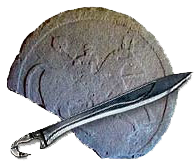Realizada por: Aixala
Al Druida: A todos los Druidas
Formulada el miércoles, 23 de noviembre de 2005
Número de respuestas: 2
Categoría: Temas Históricos y Artísticos
Rebelión de los berguistanos
Quisiera encontrar información sobre la rebelión que protagonizaron los berguistanos contra los romanos. Cuándo, cómo, porqué se sublevaron?
Muchas gracias
No uses esta información en otros sitios web ni publicaciones, sin el permiso del autor y de Celtiberia.net

Tu único clic no la borarrá, pero contribuirá a que la sabiduría del grupo pueda funcionar correctamente.
Le pongo los textos de Tito Livio, de su libro 34. Se refiere a las campañas de Catón y Manlio en el 195 a.C. Si busca Ud. más por Google, encontrará en castellano, pero no los textos mismos, creo.
34.16
(He is considered to have done three things on that day which deserve praise. One was his leading his army round the hostile camp into a position far from his ships and his own camp where his men had nothing to trust to but their courage, and also joining battle with the enemy on both sides of him. The second was his maneuver of throwing the cohorts on the enemy's rear. The third was his order to the second legion to advance in battle formation right up to the gate of the camp while the rest of his troops were scattered in pursuit of the enemy.) After this battle the consul's victorious advance was uninterrupted. When the signal had been given to retire and he had withdrawn his men loaded with spoil into camp, he allowed them a few hours' rest and then led them off to harry the fields. As the enemy had been scattered in flight they extended their depredations over a wider extent of country, and this action contributed no less than the battle to force the inhabitants of Spanish Emporiae and the settlers amongst them to surrender; many from other communities who had taken refuge in Emporiae also surrendered. The consul addressed them all in kind terms and dismissed them to their homes. He at once resumed his advance, and wherever his army marched delegates from the various communities met him to make their surrender. By the time he reached Tarraco the whole of Spain on this side the Ebro had been subjugated and the soldiers belonging to the Roman and allied troops who had through various mishaps been made prisoners in Spain were brought by the natives as a gift to the consul. Then a rumour was spread that the consul intended to take his army into Turdetania, and it was even reported-quite falsely-that he had actually marched against the secluded dwellers in the mountains. On this idle and absolutely groundless rumour seven fortified places belonging to the Bergistani revolted. The consul reduced them to submission without any serious fighting. After he had returned to Tarraco and before he made any further advance these same people again revolted and again they were subdued, but they were not treated so leniently. They were all sold into slavery to prevent any further disturbance of peace.
34.17
In the meantime the praetor, P. Manlius, marched into Turdetania with the army which he had taken over from his predecessor Q. Minucius and, in addition, the force which Appius Claudius Nero had commanded in Further Spain. The Turdetani are considered the least warlike of all the Spanish tribes; nevertheless, trusting to their numbers, they ventured to oppose the Roman armies. A cavalry charge threw them at once into disorder; the infantry encounter was hardly a contest, the seasoned troops, familiar with the tactics of the enemy, left no doubt as to the issue of the fight. Still, that battle did not end the war. The Turduli hired a force of 10,000 Celtiberian mercenaries and prepared to carry on hostilities with foreign arms. While this was going on, the consul, seriously perturbed by the rising of the Bergistani, and convinced that all the other tribes would do the same whenever they had the chance, disarmed the whole of the Spanish population on this side of the Ebro. This step aroused such bitter feeling that many of them destroyed themselves, for they were a brave and high-spirited nation, and did not think life worth living without the possession of arms. On this being reported to the consul he summoned the senators in all the cities to meet him. "It is not," he told them, "more in our interest than in yours that you should abstain from hostilities; hitherto your wars have always involved more suffering for the Spaniards than toil and trouble for the Romans. I know of only one way in which this can be prevented, and that is to put it out of your power to commence hostilities. I am anxious to attain that result with as little harshness as possible. You must help me in this matter with your advice. I shall adopt no plan more gladly than the one which you yourselves suggest." As they remained silent, he said he would give them a few days for deliberation. After they had been summoned to a second conference, at which they still remained silent, he levelled the walls of all their cities in a single day, and during his advance against those which were still refractory he received the submission of all the cities in each district into which he came. The sole exception was Segestica, and this important and wealthy city he took by storm.
Fuente: www.gymnasiax.com/texts/livy/livy_rome34.html
Pero mejor escriba "bergistano/s", sin la u.
Hay 2 comentarios.
1